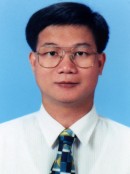
Plenary Lecture
Response of High Speed EDS Maglev Train Moving on a Suspended Guideway Shaken by Horizontal Earthquake

Professor J. D. Yau
Department of Architecture
Tamkang University
TAIWAN
E-mail: jdyau@mail.tku.edu.tw
Abstract: This paper presented a computational framework of interaction analysis for an EDS (electro-dynamic suspension) maglev train traveling over a suspension bridge shaken by horizontal earthquakes. The suspended guideway girder is modeled as a single-span suspended beam and the maglev train traveling over it as a series of maglev masses. To tune the magnetic forces in a maglev suspension system, an on-board hybrid LQR+PID controller is designed to control the dynamic response of a running maglev mass. Then the governing equations of motion for the suspended beam associated with all the controlled maglev masses are transformed into a set of generalized equations by Galerkin’s method, and solved using an incremental-iterative procedure. Numerical investigations demonstrate that when a controlled maglev train travels over a suspended guideway shaken by horizontal earthquakes, the proposed hybrid controller has ability to reduce the vehicle’s acceleration response for ride quality.
Brief Biography of the Speaker: Dr. J. D. Yau got his Ph.D. from National Taiwan University (NTU) in 1996. After serving as a chair-engineer at the Kuan-Tech Engineering Consultants Co. at Taichung in Taiwan (1997-1999), he joined the faculty at TamKang University (1999) where he has served as Assistant Professor (1999-2003), Associate Professor (2003-09), and Chair (2004-2007) in the Department of Architecture and Building Technology. In 2010, Dr. Yau became a Professor of Tamkang University, and an Adjunct Professor of Zhejiang University (2011-2013), a Visiting Professor of East China Jiao Tong University in China (2011-2014). Dr. He is also a Managing Supervisor of the Chinese Society of Wind Engineering (2012-2014). Dr. Yau has published over 60 referred journal papers and articles. His research area of interest is centered on:
1. Maglev dynamics of vehicle/guideway interaction
2. Vibration problems of high speed rails
3. Geometrical nonlinear analysis of framed structures
4. Direct integration methods for structural dynamics
5. Structural stability of thin plates